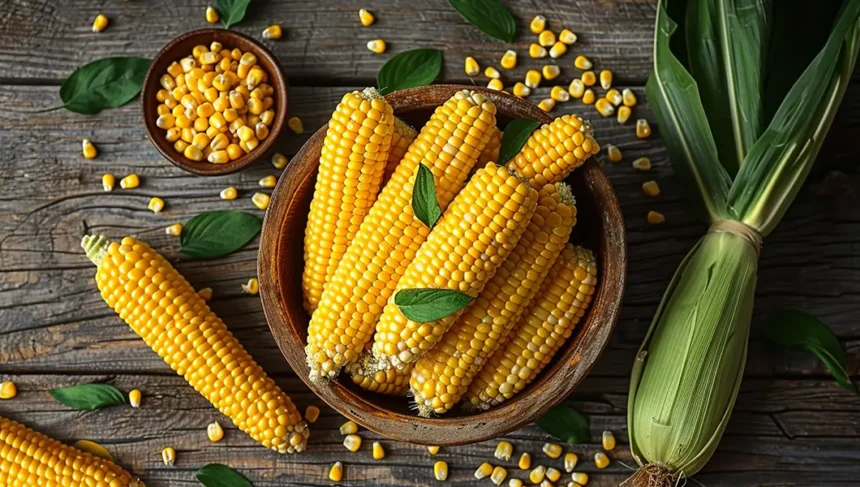Introduction to FPO Corn
FPO corn is making waves in the farming community, and for good reason. As agriculture faces unprecedented challenges due to climate change and population growth, innovative solutions are emerging. It stands at the forefront of this revolution, promising to transform how farmers cultivate their crops. With its unique properties and sustainable benefits, this variety could redefine farm yields as we enter 2024.
Farmers are always on the lookout for ways to enhance productivity while minimizing environmental impact. it not only meets these demands but exceeds them, bringing fresh hope to an industry under pressure. Let’s dive deeper into what makes FPO corn a game changer in modern agriculture.
What Makes FPO Corn Different from Traditional Corn?
It stands out due to its advanced genetic modifications. These innovations enhance traits like drought resistance and pest tolerance, making it a reliable choice for farmers facing climate challenges.
Unlike traditional corn, FPO corn is engineered specifically for higher yields. This means that farmers can expect to harvest more grain from the same amount of land.
The cultivation process also differs significantly. It requires less water and fewer chemical inputs, which can lead to cost savings over time.
Moreover, it offers improved nutritional profiles. The biofortified varieties are designed to provide better health benefits for consumers.
Another critical difference lies in its adaptability. It thrives in diverse environments — from arid regions to areas with heavy rainfall — proving itself a versatile crop option for various farming conditions.
Benefits of Using It for Farmers
Farmers are always searching for ways to enhance their productivity, and FPO corn presents a compelling solution. This innovative variety offers increased resistance to pests and diseases, reducing the reliance on chemical pesticides. Healthier crops mean less stress for farmers and improved yields.
Another significant advantage is its drought tolerance. With unpredictable weather patterns becoming more common, it thrives even in dry conditions. This resilience can lead to consistent harvests year after year.
Additionally, FPO corn has been engineered for higher nutrient density. Farmers can produce not just larger quantities but also healthier crops that appeal more to consumers focused on nutrition.
Adopting it can position farmers as leaders in sustainable agriculture practices. By choosing this advanced crop variety, they contribute positively to environmental health while boosting their own profitability.
Impact on the Agriculture Industry
FPO corn is making waves in the agriculture industry, transforming how farmers approach crop production. Its unique genetic makeup allows for higher resilience against pests and diseases. This means fewer chemical treatments, which can reduce costs and improve soil health.
Moreover, it’s adaptability to varying climates enhances food security. Farmers can cultivate this innovative crop in regions that traditionally faced challenges with yield stability.
The economic ripple effect is significant as well. Increased yields lead to more robust supply chains and better profitability for farmers. This improvement supports local economies and encourages investment in agricultural technology.
As it gains traction, it encourages a shift toward sustainable farming practices across the board. The industry’s embrace of such advancements could pave the way for future innovations that further enhance productivity while prioritizing environmental stewardship.
Sustainability and Environmental Benefits
FPO corn stands out as a game-changer in sustainable agriculture. Its unique genetic makeup allows it to thrive in various climates, reducing dependency on water and fertilizers. This adaptability means farmers can achieve higher yields with less environmental strain.
One of the most significant benefits is its role in soil health. It encourages biodiversity by promoting beneficial microorganisms that naturally enrich the soil. Healthier soils lead to increased carbon sequestration, helping to combat climate change.
Moreover, it requires fewer pesticides due to its inherent resistance to pests and diseases. This minimizes chemical runoff into local waterways, protecting ecosystems from harmful pollutants.
Farmers adopting it practices are not only improving their productivity but also contributing positively to the planet’s future stability. By prioritizing sustainability through innovative crops like this, we pave the way for responsible farming methods that will endure for generations.
Future Potential of FPO Corn
It holds immense potential for the future of agriculture. As climate change continues to challenge traditional farming methods, this innovative crop can adapt better to diverse conditions.
Its resilience means that farmers could face fewer losses due to unpredictable weather patterns. This adaptability not only ensures consistent yields but also fosters food security.
Moreover, FPO corn’s improved nutrient profile opens doors for new markets and consumer products. From healthier snack options to enhanced animal feed, the versatility is promising.
Research into genetically fine-tuning it may lead to even greater advancements in yield and sustainability over the coming years. Farmers willing to embrace this innovation might find themselves at a competitive advantage.
As technology evolves, so too will opportunities surrounding it. The agricultural landscape is poised for transformation, driven by those who dare to innovate and experiment with this revolutionary crop.
Where is the additive corn syrup used fpo r
Additive corn syrup plays a significant role in various food products. It’s primarily used as a sweetener, enhancing flavors and improving texture.
You’ll find it in sodas, candies, and baked goods. The syrup provides that delightful sweetness consumers crave while maintaining cost-effectiveness for manufacturers.
Moreover, its versatility extends beyond the kitchen. Additive corn syrup is often utilized in sauces and dressings to create smooth consistency.
In the realm of processed foods, this ingredient helps preserve freshness by acting as a moisture-retaining agent.
As more producers explore it for their syrup production, they may discover improved quality and sustainability benefits. This shift could reshape how we think about ingredients in everyday items.
Conclusion: The Future of Farming
The emergence of FPO corn marks a significant shift in agricultural practices. Its ability to deliver higher yields and resist pests makes it an attractive option for farmers looking to enhance productivity. As more growers adopt this innovative crop, the overall efficiency of farming operations is expected to improve.
Farmers will likely see reduced costs associated with pesticide use while reaping the benefits of increased profitability. Additionally, as consumers grow more conscious about sustainable farming methods, it aligns perfectly with these values by promoting environmentally friendly practices.
Looking ahead, the future of agriculture seems bright with it leading the charge. This revolutionary crop not only enhances farm outputs but also contributes positively toward sustainability goals in food production. The integration of technology into farming continues to evolve, and crops like it are at the forefront of that transformation.
With ongoing research and development, we can expect further enhancements that will make it even more resilient and efficient over time. The potential for this additive crop syrup extends beyond traditional uses in food products; its versatility could open new markets and applications within various industries.
Farming has always been about innovation and adaptation. With advancements such as FPO corn paving the way, there’s no telling how far agriculture can progress in meeting global demands while nurturing our planet’s resources effectively.










